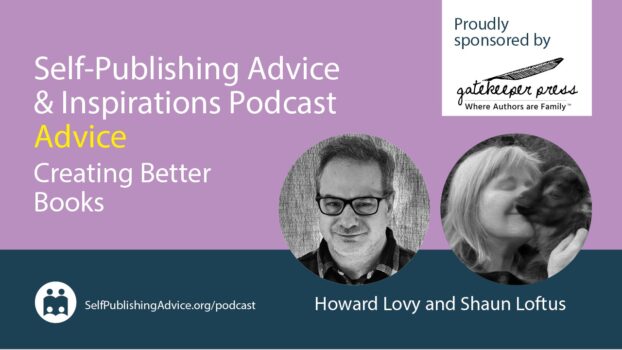
Karen Myers urges fellow writes to expand their indie author business to strengthen their position as authorpreneurs
Authorpreneur Karen Myers explains why indie authors need to keep learning and expanding their indie author business activity in order to remain vibrant, profitable and dynamic in an increasingly diverse publishing marketplace.
She draws on examples of opportunities she has seized upon to grow her expertise, her reach and her reputation, while continuing to write and publish her own series of fantasy and sci-fi novels.
Resting on your laurels?
You've climbed that first hill. Congratulations!
You've written a book or several, you've presented the world with a few well-written, well-formatted, well-edited stories, and you're settling into a world of writing, pleased that you've come some distance up the path from your initial indie panic at all the different skills you need (not least your writing skills).
Your pencils are sharpened and you're ready to really bear down on the writing process, now that you have a handle on it and know how your books will actually make it into the book retail trade, and who you can call upon for extra help when you need it for covers, etc.
STOP. WAKE UP.
What is it we find backward about traditional authors and author-wannabes? The notion that all they need to do is write, and someone else will take care of all that stinky stuff like marketing and all the business issues.
Is that what you want to do?
Don't forget — you're not an indie AUTHOR, you're an indie AUTHOR-PUBLISHER. You don't get to just disappear into your writing and hope that everything else can just follow the initial methods you've chopped out of your research for how-to-publish, as though that were something static and unchanging.
No, that's just the FIRST step.
How Businesses Start
I've built & run a lot of small (10-1000 people) businesses, and there are common paths for all of them that apply to the indie author-publisher business. See if these seem familiar to you…
1. One bright idea gets it going
In our case, that's usually our first writing project. We all understand that thrill, whether we come to it cold-bloodedly as a business, or passionately as an obsession, or determinedly as a memorial.
2. The bright idea needs work (but that's fun)
We discover our creative weaknesses and begin tooling up to improve and handle the task of producing a document that others will want to read. Parts of this are hard work, and it all requires the discipline to sit down and write, but it's fun watching the pages mount up as you create something out of nothing. We begin to understand that we can learn and improve at this forever.
3. Systems & processes need to be created to make the bright idea available. That's a different skill set.
Just learning the minimum about what is necessary to get a book to market in terms of edit, format, cover, distibution — that's a stretch for many of us. There are resources to help you learn how to do it yourself, and there are freelancers and services who will do some of it for you
Once the book is out, you need to track sales and payments, and all the activities that go with any commercial enterprise.
If you're not business-minded, you may find the learning, the tracking, and the overseeing of all this activity uncomfortable to manage.
4. The bright idea is now available
Hurray! You have made your vision for (1) above manifest and people actually pay you for it (whether or not you're making a profit).
5. Expand on the bright idea
You're sure you have more books in you. Everyone says (and they're right) that you need several (or lots of) books in inventory before you worry too much about anything else.
So, off you go, back to your desk where the writing brings its own satisfactions.
6. Now what?
This is the place where most small businesses go to die, if they ever get off the ground in the first place.
It happens more quickly for companies with more than one employee, where the inability to keep the expensive labor resources utilized at 100% capacity can drain the bank inexorably. When there's just one person, it manifests as an inability to take on any more work, or produce work any more quickly, etc.
There's also the nagging feeling that the initial bright idea might not be bright forever. Perhaps the genre is evolving away from it, or perhaps it feels stale. There's always a risk that the body of work drifts out of fashion and diminishes due to market changes. One morning you look around, and the work you're investing in looks like a trap. What else should I be doing?
7. What are your assets?
At this point, you're well on the path to writing reasonably well. You know people read your books so your product is acceptable (even if your marketing isn't all it might be). You're comfortable with the basic processes of bringing your books to market.
On the one hand, you can potentially diversify your writing — new genres, pen-name, variety of sizes, new formats, and so forth.
Diversifying your product helps mitigate some of the risk on the creative side. Very few companies make a long-term success out of a single bright idea, like a single series in a single genre with dozens of entries.
But you have other assets besides your improved creative skills — namely, you know how to publish a book, at least your own books. That's a skill, too. Just to stay around this long, you've necessarily mastered a certain degree of skill on the publishing side.
In fact, you've probably invested in advertising systems, tracking systems and other tools just for your own books. You've had to tool up in ways that cost money and/or time which may feel like overkill for what you need or can get out of them for your own use.
8. How do you leverage and expand on your business skills?
Ah. That's the question. It's not like the initial publication skills, where you can get a basic recipe for “do this for this retailer” or “here's how to format”. There's no one-size-fits all.
You can (and should) make plans about growing in this area (“I really need to expand on my advertising knowledge/look at this sales tracking tool/integrate these processes”).
But some of this can't really be planned. Some of it is opportunistic. And you need to develop a habit of embracing opportunities when they come along. It's the best way to learn — often there's a way to mitigate the costs of doing something for the first time because of the nature of the opportunity.
I used to explain to employees in new startups that it was often more important to learn what NOT to do than to come up with the next bright idea. There are things that will kill a business quickly that they needed to learn to recognize. “I won't ever do THAT again, whatever I do” is some of the most valuable learning you can acquire.
When someone comes along with a “would you be interested in doing…” try to find a way to say “yes” if it makes any sort of potential long-term sense at all.
Author Business Opportunities Come Knocking
Let me give you some personal examples.
I've always assumed I might publish other people, without any firm economic understanding of how or when that might make sense. On the planning side, a year ago, I arranged with a lawyer friend to produce a standard book contract I could use as a publisher for others as a necessary first step. On the opportunity side I uncovered old colleagues of mine, previously trad-published, who could no longer get their orphan works into the trad marketplace, who were incapacitated (age, illness) from going full indie themselves, and who were becoming desperate.
That made for a perfect learning environment. They needed the help, I could learn on someone who would be grateful just to get their work out there, and my existing tracking systems could be expanded to full publisher, not just for my own work. I created royalty tracking tools, pricing calculators, hours trackers, and so forth, so that this part of the business could be analyzed by itself. Any hiccups on my side were covered by favorable terms for these favored initial authors. Lots of my existing tools that I had invested in were made more valuable by the additional responsibility they could handle.
One of these authors has just released (through an imprint of mine) his first work of fiction, and suddenly I'm in the throes of a mini-fame situation: my first hardcovers, inventories for signed copies, cartons for bookstores, solicited translations, etc. I'm exploring offset and fulfillment, something I haven't needed, because here is a legitimate need, and so I will learn how to to that effectively. It's already forced me to find an alternative to Amazon KDP for POD for advance author copies. I get to learn how to do this in the forgiving company of a grateful author who happens to be an old friend, and of course I will get some income, even at my friends-and-family rates.
A few months ago, I volunteered to give a “This is the world of indie” talk to a group of local writers. This was more pro bono and networking than trolling for business, but a consulting gig came out of one of the attendees who is himself well-networked in the community.
And then, a stranger in a local city who needed a publisher turned to a newspaper editor friend for advice, who recalled the article in his paper on that writers' group talk and gave him my name. Now the author and I are about to sign a contract. His book will take me into the world of color interiors, library editions, and distribution in the US Air Force. For him, it's a labor of love. For me, it's a great way to acquire new skills and get (modestly) paid for it.
So Be Opportunistic
There's no planning for these sorts of things. You need to have a reasonable understanding of possible long-range plans, so you know what is and is not in your eventual interest, and then jump on opportunities to further anything that appears in that sweet spot, even if the timing is unexpected.
There's no better way to learn than by doing, in favorable circumstances, and getting paid for it at the same time so that you can understand the needs/costs of the process and figure out how to do it more professionally next time.
You can't build a business out of these occasional opportunities — but they make it possible to identify useful business lines and to fund some of the tool investment you'll need. Most importantly, they let you investigate whether they represent business lines you want to expand upon. If so, then you can add the marketing and everything else you'll need to attract more of them.
If you don't try, you can't learn. If you don't learn, the broader world expands around your small brightly-lit space, but you have no way of reaching into it.
OVER TO YOU How have you found ways to diversify and expand your author business? We'd love to hear more examples like Karen's.
#Indieauthors - don't rest on your laurels! Diversify! Keep learning, growing & building your #author business. Here's how & why - by authorpreneur Karen Myers @HollowLandsBook Click To TweetOTHER POSTS ABOUT RUNNING AN AUTHOR BUSINESS
From the ALLi Author Advice Center Archive
https://selfpublishingadvice.org/author-earnings-through-author-business/






So, keep learning new things then? Yeah! I’m not sure I got anything else from this article. How would you recommend getting your book distributed? Or are you talking about Amazon doing this for you? Do you need to be past a book sale range before shops will stock your book? Thanks!
Well said!
Thank you so much!
Thank you for the advice! As well as for sharing your experiences!
Thanks, Karen, for the reminder that we always have to keep growing. Helping other authors get (re)published is a great way to use the knowledge you’ve acquired over the years. Perhaps your next step is to coach successful indies who also want to make a little money helping others in the same way! And then you could teach them to be coaches themselves…we could end up with a network of micro-publishers who all started as self-publishers, which sounds like a very strong publishing “hive” to me.
I think that will inevitably happen — one of the most obvious expansion paths for indie-authors is towards micro-publisher. You can only write as much as you can write — to grow, you need more authors.
What I would love to see established, but haven’t yet, is a way to handle estate roll-ups. Who will we leave our businesses to? If I build a hardware store business and my heir doesn’t want to learn how to take that over, he can sell the business. What if my heir doesn’t want to learn how to be a micro-publisher? How can he/she realize value out of the asset he inherits from me? How do I keep all those works from becoming orphans?
I believe that the natural decision of most indie-initial micro-publishers would be to arrange for a hand-off in their estate planning:
A) Micro-publisher (or indie-author) X leaves his business to micro-publisher Y.
B) Receiving micro-publisher Y arranges to pay a percentage of earnings to the heir of X for some length of time, and digests all the works and contracts into his own business.
These relationships have to be set up ahead of time, and the practice has to become standardized and normalized, but I believe this is the natural way to handle our publishing estates.
My longest range goal is to be in a position to accept roll-up estates from other micro-publishers, and to be able to assign my own estate to be rolled up into some other micro-publisher. That’s the long-term goal I’m working toward.
I’ve been meaning to write some articles about this and to start the discussion going, but (you know how it is) I’m busy, and in these first few years of the youthful indie revolution, no one is ready to think about the inevitable conclusion of all human activities.
Oh my goodness. This came at the most opportune time as I am considering my options (and pulling my hair out) for the new year. Thank you so much for this insightful post with brimming with positive entrepreneurial spirit!